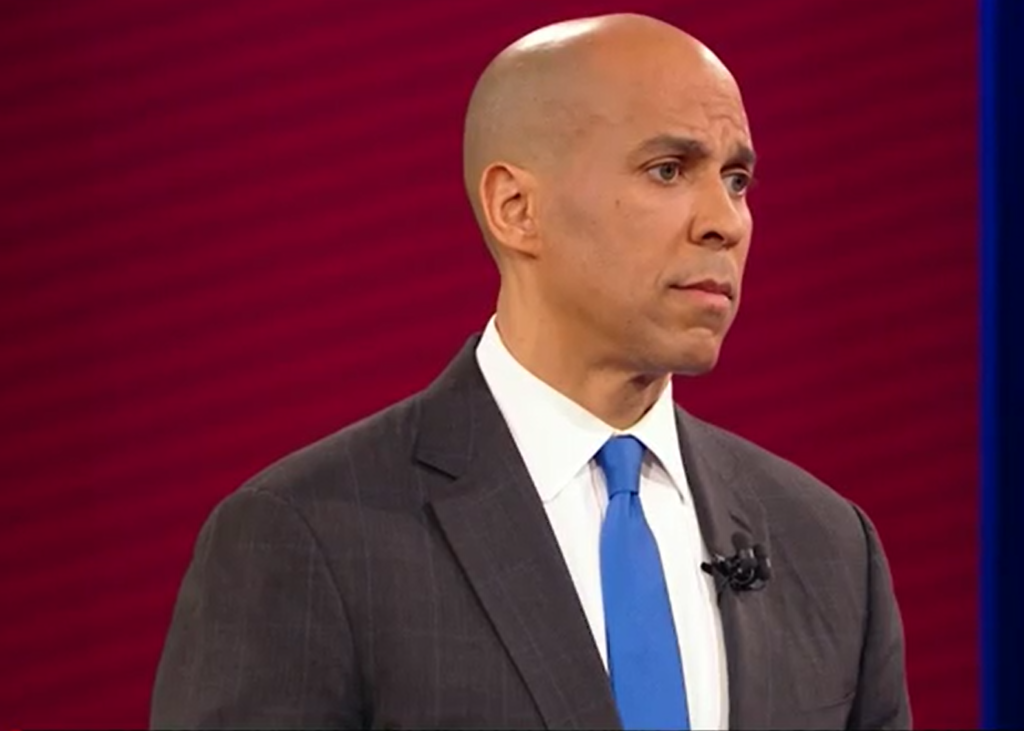All Cory Booker Needs is Love from the Democratic Party Base
Listen to audio version of this article

As he struggles to break out of the second tier of presidential contenders, it’s increasingly clear that Sen. Cory Booker’s peace and love message has little resonance among a party base whose sole motivation is a visceral hatred of all things Trump.
Booker’s turn the other cheek plea has largely been ignored and he remains firmly mired in sixth place with support between two and six per cent. His fund raising has been mediocre at best, off the pace set by the top four candidates, but sufficient to maintain viability.
In an atmosphere as politically toxic as that currently blanketing the nation, it is inevitable that civil discourse is cast aside and replaced by personal insults and reckless allegations of misbehavior and illegal conduct.
In this environment, Booker --- preaching respect for the opposition rather than despising them --- has achieved little headway.
In the Real Clear Politics average of polls, Booker stands well behind former Vice President Joe Biden, Vermont Sen. Bernie Sanders, Senate colleagues Kamala Harris of California and Elizabeth Warren of Massachusetts, former Texas Congressman Beto O’Rourke, and Pete Buttigieg, mayor of South Bend, Ind., with an unprounceable name.
He’s slightly ahead of Senate colleagues Amy Klobuchar of Minnesota and Kirsten Gillibrand of New York.
Borrowing from Abraham Lincoln, Booker’s appeal to “the better angels of our nature” has failed to gain any traction in an environment dominated by vitriol, resentment and rancor --- qualities more common to demonic forces rather than angelic ones.
Granted, the presidential election is more than 18 months off and Booker --- a compelling orator and presence --- has an opportunity to make up ground in candidates’ debates and the media exposure they provide.
It is, though, unlikely that greater civility will descend on the political world, carried down from above by “the better angels of our nature.”
In truth, the atmosphere is apt to become even more harsh, stoked by supporters of impeachment proceedings against the president and demands that the candidates unleash Trumpian-like assaults on him.
The party mood is not one of conciliation but confrontation, a belief that since Trump is responsible for creating the climate of anger and contempt, a response in kind is necessary.
It is not in Booker’s nature to embrace that strategy. Even his arm-waving outrage during
Senate Judiciary Committee confirmation hearings seemed more for the sake of drama than any deeply-held, genuine personal animosity.
There is no doubt he is convinced that Trump is disastrous for the country, that the constant uproar and chaos billowing almost daily out of the White House is damaging domestically and undermines the country’s standing in the world.
He views the presidential election as a contest between sharply differing ideologies and vision, a hard-fought competition for the hearts and minds of the American people and, when it’s over, the combatants will demonstrate magnanimity and mutual respect.
In the minds of many, Booker’s is a quaint notion. For them, it’s about spilling blood, a bareknuckle, eye-goughing, give no quarter brawl ending only when the vanquished lies prostrate in the dirt. It’s mixed martial arts in suits and ties.
Booker suffers also from a media cheering every anti-Trump shot, the more colorfully and insultingly phrased the better. They know that Trump cannot help himself and he’ll return the blows with equal contempt.
Booker cannot thrive in this atmosphere. His style is dismissed in the unique manner the media describes the ordinary, mundane and unworthy of time and interest: “Nobody writes about the planes that land safely.”
Booker’s central theme that progress is possible only through a government capable of overcoming differences of policy and philosophy in pursuit of the greater good would --- in normal times --- strike a responsive popular chord.
Reaching across the partisan divide and making common cause with one’s opponents is out of fashion at the moment and those who urge such action --- like Booker --- are equally out of fashion.
There are, of course, others in the race who share his outlook to one extent or another and are worried that continued bitterness and division will produce a government so dysfunctional and paralyzed by animosity that the nation’s compelling needs will go unmet to the point of crisis.
It may be that Booker is someone who’s emerged at the wrong time and place in history and that he’ll re-emerge stronger at some future point when tempers have cooled and order restored to the process. He is, after all, only 50 years old, an incumbent U. S. Senator for as long as he desires to keep the job and more than ample time for another run at the White House.
For now, though, moving upward and overtaking the half dozen personalities ahead of him appears to be a superhuman task.
__________________________________________
Carl Golden is a senior contributing analyst with the William J. Hughes Center for Public Policy at Stockton University.






Booker has 2 major problems; first, he is taking positions in contradiction with his past and, two, his party has become the party of hate. They hate Trump, capitalism, America, police, immigration laws, the Constitution, religion and anyone who doesn't think the way they do. With his phony Spartacus moment with his crocodile tears of rage, the new Democrat base thought they had a true hater. Now that he is exposed, he can't get traction.. He's launched his campaign 3 times and nothing has caught on. Of course being from the Christie-tainted state of NJ doesn't help.